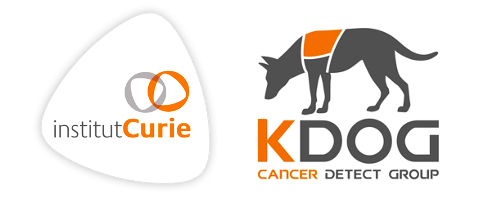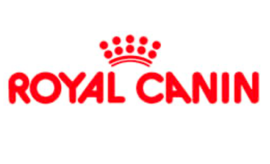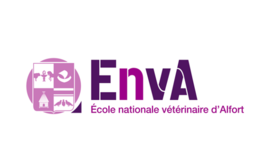KDOG CLINICAL STUDY
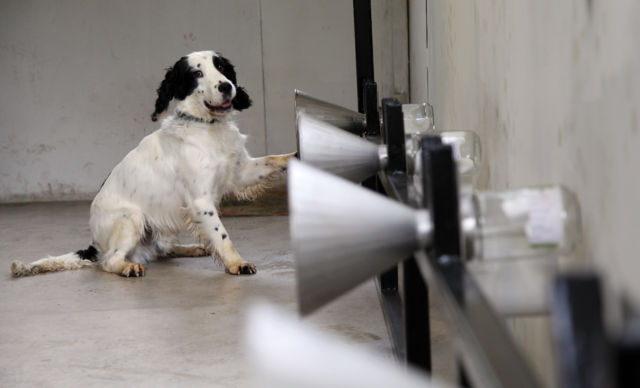
Context, principle and objective
Background
Dogs have a sense of smell 100,000 to 1 million times more sensitive than the human sense of smell. Trained in detection, dogs would be able to detect the characteristic odor of a cancerous tumor in body fluids such as sweat. So the KDOG team came up with a new technique for breast cancer screening: the woman would place a compress on each breast overnight to absorb the sweat and then send it in an envelope to the dog center for the dogs to analyze it.
Principle
The purpose of a clinical study is to prove the validity or invalidity of certain scientific hypotheses and to evaluate the efficacy and tolerance of a diagnostic method or treatment. Through this study, KDOG wishes to evaluate the sensitivity and specificity of the dogs and thus prove the performance of its screening method, in order to be able to deploy it on a large scale.
Its characteristics :
Duration: 3 years
Number of samples (anonymized): 450
Sampling centers : Institut Curie Paris, Institut Curie Saint-Cloud, Centre Saint-Joseph, ICO of Nantes, CH Valenciennes, private radiology practice.
Test center: canine center of Champvoisy
Objective
This study attempts to transform the very promising results of the preliminary study into a medically recognized and globally reproducible method. If it turns out that it is indeed possible to diagnose breast cancer using sweat-soaked compresses presented to dogs, this simple, inexpensive, non-invasive, painless test could be incorporated into screening protocols as a pre-test for mammography. This would pave the way for new organized screening strategies accessible worldwide.
Sample collection
In order for the dogs to be operational during the clinical study, they must first be trained. KDOG therefore needs to collect samples for both training and the clinical study.
Dog training
1. Positive samples
They are collected from patients who have been diagnosed with breast cancer. Some partner doctors inform the patients and offer them the opportunity to participate in the project by providing the dogs with samples for training.
2. Negative samples
They are collected from volunteers with negative mammograms less than three months old.
To date, more than 1,000 volunteers have enabled the project to collect healthy samples for dog training. Many actors are involved in this collection, including the Seintinelles Network, composed of women who wish to support cancer research, particularly breast cancer.
• • •
THANK YOU ALL!
• • •
The clinical study
The clinical study involves 450 samples taken from women with abnormal mammograms. The results of the biopsies, which may or may not confirm the presence of cancer, will only be known at the end of the study and will serve as a reference for the analysis of the results obtained with the dogs.
Anne Tardivon has been working as a radiologist in the Fight Against Cancer Centers since 1992, and at the Curie Institute since 2002. Specialized in breast cancer imaging, she is the principal investigator of the KDOG clinical study. Her role is to accompany the six partner centers and collect samples from patients to send them to the KDOG team.
Partner hospitals :
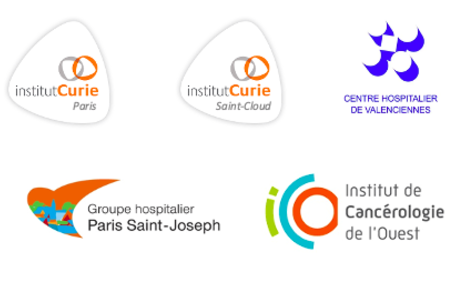
The canine team
Today, 3 dogs, of different breeds, train in the center of Champvoisy. They are monitored by veterinarians and are selected and trained by KDOG's partner canine practitioners. The Institut Curie team visits them every week to make sure that the study is running smoothly.
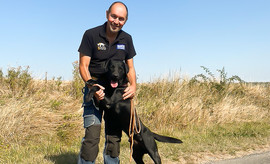
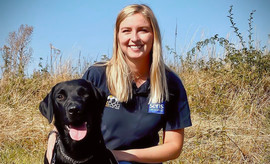
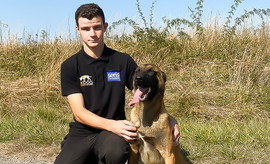
The protocol and the pace of work are the result of discussions between the KDOG team, dog handlers, veterinarians, and ethologists to ensure that they are best suited to the requirements of the study and animal welfare:
- Deep memorization phase: dogs must memorize the smell of breast cancer on compresses that have been directly in contact with a cancerous tumor.
- Reduction of the threshold level: the dog continues to train with compresses soaked in sweat, previously placed on a cancerous breast.
- Case study: the "cancer" compress is placed in the middle of "healthy" compresses.
- The dog learns to mean nothing when all the samples are negative.
- The dog works in complete autonomy (without leash).
The canine team is accompanied by our sponsor SERIS, who helps, among other things, to ensure good working conditions.
The scientific team
The KDOG team is surrounded by many scientists who provide their specific skills to the project. The clinical study requires, among others, the skills of a methodologist from the Curie Institute, Alexia Savignoni, two ethologists/veterinarians, Caroline Gilbert and Valérie Freiche, and a computer scientist, Damien Truffaut.
